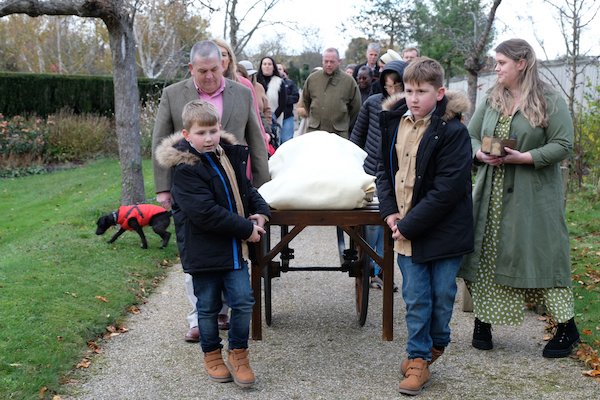Consumer concern about environmental issues – fuelled further by the recent COP26 conference – is only going to increase. We asked funeral sector expert Simon Cox for his view on what we can expect of consumer demands
I first gave a talk back in Sept 2019 at University of Bath’s Death Dying and Disposal International Conference, speculating that technology, transparency and regulation would catalyse significant change in the sector.
Now that we are predictably moving through the impacts of CMA and FCA – and the unforeseen devastating impact of Covid – it is clear from market insight and trends that the next major sector disruption will come from consumers demanding more ‘sustainable funerals’.
When I co-founded independent research and consultancy business, Funeral Solution Expert early in 2021, we were keen to fulfil a promise to support good outcomes for consumers and do something positive for our environment.
So, a few months back now (and well before COP26) we commissioned a consumer survey focused on how consumers feel about the environment in relation to funerals, and in particular how and where they would like environmental improvements to come about.
We asked a nationally representative group of UK adults some simple questions; firstly, whether they would prefer a funeral that had less impact on the environment, whether they would consider one or that environmental consideration would have no influence over their choice.
Nearly 80% of people said environmental considerations would influence their choice of a funeral, while 4 in 10 (44%) also said they would prefer a funeral that had less impact on the environment.
This feeling is strongest amongst Generation X (people aged between 39 and 54) and Baby Boomers (55-71). Least bothered are the silent generation (aged 72+) – a rapidly reducing cohort and arguably their funerals are arranged by their children anyway.
As well as a clear age factor (more younger people are highly motivated), recent trends insight[1] published by Trajectory Partnership talks of the rise of the ‘dark greens’. These consumers demand environmentally positive solutions across all aspects of their lives and every solution choice they make. It is estimated this group stands at 4.3% of all UK adults but forecast to grow rapidly.
Having established initial views in our survey, we then asked which, if any, environmentally friendly changes they would want for their own funeral?
Our respondents could select more than one option but the sentiment was clear. 50% would prefer a coffin manufactured from materials that offer environmental benefits, 36% wanted equipment in the cremation process to make it less polluting, and 32% wanted electric hearses. Just 1 in 4 felt that none of these choices were for them.
So, we asked consumers if they could just choose one improvement what would it be? Over half (52%) said they wanted more environmentally beneficial coffins. Followed by less polluting crematoria equipment (21%), and electric powered hearses (15%).
No doubt larger players Co-op and Dignity who produce their own coffins, along with the big independent coffin manufacturers (JC Atkinson and Halliday’s) will be anticipating these changes, but will they be agile enough to satisfy consumers and resist the temptation to greenwash product ranges? If there’s one thing a ‘dark green’ consumer hates it’s a bit of greenwashing!
This trend also offers opportunity for disrupter firms like LifeArt and Somerset Willow to flourish because they better meet consumer demand with decarbonised solutions. The Natural Burial movement would say a coffin is less of a problem if it’s buried rather than burned, but at last count cremation continues to creep up to nearly 80% of all funerals, so the MDF veneer coffin workhorse is a serious issue. Funeral directors take note!
Improvements to crematoria more than electric cars and hearses is where consumers look to next for improvement. Mercury abatement was a challenge in early 2010s, and the sector made swift progress to meet its 50% abatement target. Clearly, more could be done.
In addition, the emergence of NOx emissions has and is likely to get more attention. The BBC conducted their first analysis of which crematoria had NOx abatement equipment in 2018. It won’t be long until this topic hits the headlines again. I’m aware significant progress is being made with the use of biofuels, NOx abatement equipment and heat exchange and all are steps along the right path, but is this ambitious enough?
Who is going to be brave enough to invest in some of the development technology, whether those solutions are electric, water or organic-based?
The Environmental Stewardship Group led by ICCM, FBCA, CDS Group and The Cremation Society has brought together a variety of key players to look at some of these challenges. It’s a very positive step, but whether the outcomes will be enough to placate consumers and the media – and most importantly help the environment – remains to be seen.
Here at Funeral Solution Expert, we’ve also just completed a further consumer study that goes deeper to explore how consumers feel about the emergence of more environmentally positive funeral innovations. We’ll share the results in the coming months – the results are quite startling!

